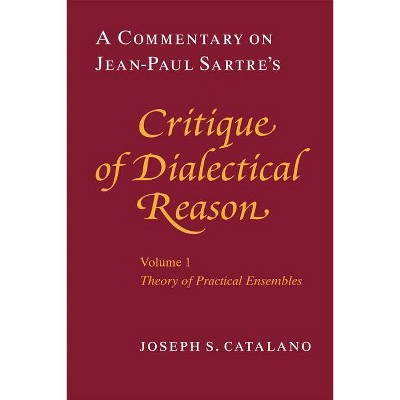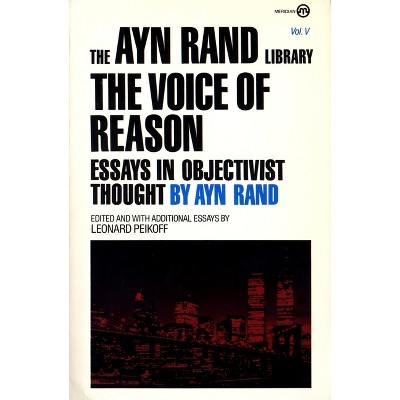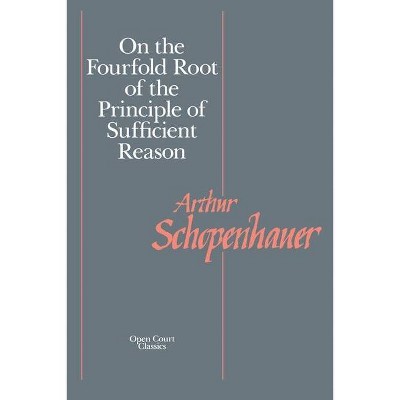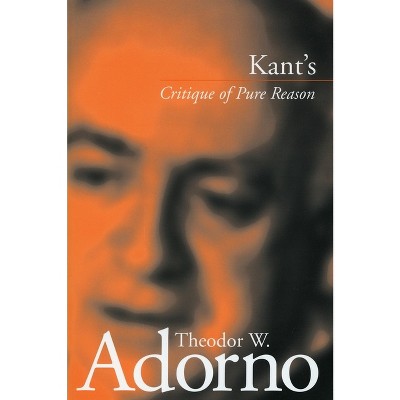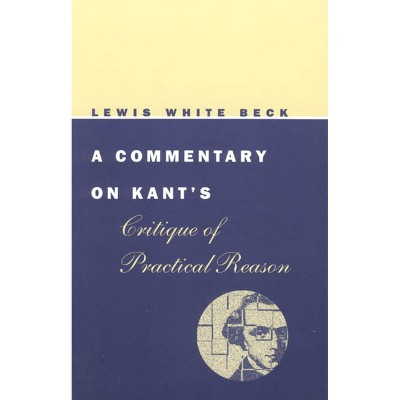Sponsored

The Powers of Pure Reason - by Alfredo Ferrarin (Paperback)
$38.00
In Stock
Eligible for registries and wish lists
Sponsored
About this item
Highlights
- The Critique of Pure Reason-Kant's First Critique-is one of the most studied texts in intellectual history, but as Alfredo Ferrarin points out in this radically original book, most of that study has focused only on very select parts.
- About the Author: Alfredo Ferrarin is professor of theoretical philosophy at the University of Pisa.
- 352 Pages
- Philosophy, History & Surveys
Description
About the Book
The goal of the present book is nothing less than to correct what Alfredo Ferrarin calls the standard reading of Kant s. Ferrarin argues that this widespread form of interpretation has failed to do justice to Kant s philosophy primarily because it is rooted in several uncritical and unjustified assumptions. Two are particularly egregious: a compartmentalization of the First Critique, and an isolation of each Critique from the others. Ultimately these two assumptions cause one to lose sight of the fact that the cognitive/epistemological functions laid out in the Transcendental Aesthetic and Analytic are functions of an overarching pure reason of which the constitution of experience (and of a science of nature) is only one problem among others. This book, by contrast, argues that the main problem, which pervades the entire first critique, is the power that reason has to reach beyond itself and legislate over the world. Ferrarin pays close attention to both the Transcendental Dialectic and the Doctrine of Method where Kant lays out his conception of cosmic philosophy as embodied in the ideal philosopher."Book Synopsis
The Critique of Pure Reason-Kant's First Critique-is one of the most studied texts in intellectual history, but as Alfredo Ferrarin points out in this radically original book, most of that study has focused only on very select parts. Likewise, Kant's oeuvre as a whole has been compartmentalized, the three Critiques held in rigid isolation from one another. Working against the standard reading of Kant that such compartmentalization has produced, The Powers of Pure Reason explores forgotten parts of the First Critique in order to find an exciting, new, and ultimately central set of concerns by which to read all of Kant's works. Ferrarin blows the dust off of two egregiously overlooked sections of the First Critique-the Transcendental Dialectic and the Doctrine of Method. There he discovers what he argues is the Critique's greatest achievement: a conception of the unity of reason and an exploration of the powers it has to reach beyond itself and legislate over the world. With this in mind, Ferrarin dismantles the common vision of Kant as a philosopher writing separately on epistemology, ethics, and aesthetics and natural teleology, showing that the three Critiques are united by this underlying theme: the autonomy and teleology of reason, its power and ends. The result is a refreshing new view of Kant, and of reason itself.Review Quotes
"An engaging and careful study that sheds light on the most interesting and cutting-edge features of Kant's critical philosophy, in particular on Kant's notion of reason and its powers and limits, while providing us, at the same time, with an undeniably useful guide that gives a better sense of Kant's critical project."
-- "Kairos. Journal of Philosophy & Science"
"Throughout the book, Ferrarin provides careful consideration of the 'many shifts, hesitations, and subtle changes expressed by Kant' in order to understand how and why, as early as the Prolegomena and throughout the 1780s and 1790s, Kant continuously modified and indeed began to abandon the standpoint of the KrV as regards 'the positive role of ideas, the function of sensibility, the definition and internal articulation of
pure reason, and the relation among faculties' "-- "Kant-Studien"
"Ferrarin's The Powers of Pure Reason is a rich and complex book, which, in the context of the current scholarship, takes a considerably original perspective on Kant. It does not limit its attention to a particular section or book or to the analysis of a specific concept in Kant's philosophy like, for example, the concept of causality or autonomy. Rather, it investigates how Kant's critical project can be seen in a unitary way, taking into consideration all three Critiques and related works. . . . In this framework, the three Critiques should be read as analyzing how reason performs its productive capacities in different domains. This means, on the one hand, that the critical project in its entirety is an attempt to determine how reason's different ends and corresponding activities can coexist in a coherent whole and, on the other hand, that the single Critiques can be better understood when they are approached from this unitary perspective. . . . The Powers of Pure Reason should be welcomed. It not only provides a fresh approach for understanding Kant's critical project as a whole, but, thanks exactly to this encompassing perspective, it also offers original and detailed discussions of many aspects of Kant's philosophy that have been debated in Kant scholarship for a long time."-- "Studi Kantiani"
"In this important book, Ferrarin addresses issues concerning the inner dynamic and unity of Kant's philosophy in its entirety. Ferrarin identifies the central unifying theme around which Kant's thought is organized as the authority of reason. He proposes a general account of reason in its primordial form, before it is differentiated into the theoretical and practical branches of Kant's system, and then traces reason's specification into constitutive principles, maxims, postulates, reflective principles, and regulative ideas. The author moves with surefooted assurance among the perspectives of the systematic whole and its parts. Drawing insights from every corner of Kant's writings, Ferrarin adroitly balances systematic concerns with attention to historical development of Kant's account of reason as he works through tensions and conflicts in the system. Ferrarin's exposition of frequently ignored sections of Kant's work, such as the 'Transcendental Doctrine of Method' from Critique of Pure Reason, and his sensitivity to Kant's highly suggestive characterizations of reason as organism, architect, and systematizing force make this required reading for every serious student of Kant. . . . Essential."-- "Choice"
"This is an unusually ambitious work whose many virtues cannot be adequately summarized in a short review. Alfredo Ferrarin not only presents a highly original account of main features of Kant's critical oeuvre (under the rubric of what he calls 'the idea of cosmic philosophy') but also introduces a novel philosophic approach, one that combines several of the best features of close reading, Entwicklungsgeschichte, and analytic reconstruction and critique. Unlike many scholars who concentrate on individual texts or work with a view to discrete topics such as epistemology or ethics, Ferrarin sets his designs on uncovering the basic intention(s) animating Kant's philosophic efforts during the final critical decades of his career. This goal motivates exceptionally unified and capacious readings whose broad scope is accompanied by an unusually nuanced and philosophically fruitful attention to Kant's language and rhetoric. . . . Ferrarin's illuminating and compelling study should be viewed as essential reading not only for those with a specific interest in the many timely subjects there discussed but also for anyone seeking a fresh appraisal of the accomplishment and promise of Kant's oeuvre as a whole."
-- "Notre Dame Philosophical Reviews"
"Throughout this rich, erudite, and provocative work, Ferrarin seeks to illuminate 'the powers of reason and the compatibility between our finitude and reason's essence as a priori synthesis and activity.' Concomitantly, Ferrarin undertakes a thorough reexamination of Kant's conception of reason's structure, its internal articulation and its drive to unify both its experience of the world and its own activity. The questions of reason's most fundamental powers and its ultimate unity are two aspects of the question of reason's essence, and they prove to be interwoven, for reason is nothing but a synthesizing power active in multiple domains, the ultimate manifestation of which is reason's reflexive concern with its own unity."
-- "Kantian Review"
About the Author
Alfredo Ferrarin is professor of theoretical philosophy at the University of Pisa. He is the author or editor of several books, including Hegel and Aristotle.Dimensions (Overall): 8.9 Inches (H) x 5.9 Inches (W) x .8 Inches (D)
Weight: .95 Pounds
Suggested Age: 22 Years and Up
Number of Pages: 352
Genre: Philosophy
Sub-Genre: History & Surveys
Publisher: University of Chicago Press
Theme: Modern
Format: Paperback
Author: Alfredo Ferrarin
Language: English
Street Date: November 3, 2016
TCIN: 1006093879
UPC: 9780226419381
Item Number (DPCI): 247-35-1582
Origin: Made in the USA or Imported
If the item details aren’t accurate or complete, we want to know about it.
Shipping details
Estimated ship dimensions: 0.8 inches length x 5.9 inches width x 8.9 inches height
Estimated ship weight: 0.95 pounds
We regret that this item cannot be shipped to PO Boxes.
This item cannot be shipped to the following locations: American Samoa (see also separate entry under AS), Guam (see also separate entry under GU), Northern Mariana Islands, Puerto Rico (see also separate entry under PR), United States Minor Outlying Islands, Virgin Islands, U.S., APO/FPO
Return details
This item can be returned to any Target store or Target.com.
This item must be returned within 90 days of the date it was purchased in store, shipped, delivered by a Shipt shopper, or made ready for pickup.
See the return policy for complete information.






